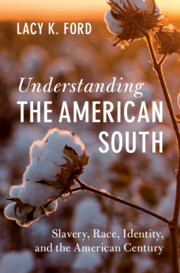Book contents
- Understanding the American South
- Cambridge Studies on the American South
- Understanding the American South
- Copyright page
- Dedication
- Contents
- Introduction
- Part I Understanding the American South and the Civil War in a New Century
- Part II Understanding the South and the American Identity
- Part III Understanding Slavery, Race, and Inequality in the American South
- 5 The Problem of Slavery Reconsidered
- 6 The Legacy of W. E. B. DuBois
- 7 An American Elegy
- 8 Transforming Southern History
- 9 The Fraying Fabric of Community
- Part IV Understanding History and Irony
- Bibliography
- Index
5 - The Problem of Slavery Reconsidered
The South, the Nation, and a Reflection on “The Travail of Slavery”
from Part III - Understanding Slavery, Race, and Inequality in the American South
Published online by Cambridge University Press: 05 December 2024
- Understanding the American South
- Cambridge Studies on the American South
- Understanding the American South
- Copyright page
- Dedication
- Contents
- Introduction
- Part I Understanding the American South and the Civil War in a New Century
- Part II Understanding the South and the American Identity
- Part III Understanding Slavery, Race, and Inequality in the American South
- 5 The Problem of Slavery Reconsidered
- 6 The Legacy of W. E. B. DuBois
- 7 An American Elegy
- 8 Transforming Southern History
- 9 The Fraying Fabric of Community
- Part IV Understanding History and Irony
- Bibliography
- Index
Summary
This chapter focuses on historian Charles Sellers’ argument that by the mid-nineteenth century, many white southerners, influenced by the spirit of American democracy and the values of evangelical Christianity, could never fully embrace the proslavery argument and maintained only a half-hearted commitment to the region’s peculiar institution based on economic necessity and racial fear. Sellers argued that most white southerners experienced moral unease if not full-fledged guilt over how to justify living in a slaveholding society. In Sellers’ view, this “travail of slavery” burdened white southerners throughout the late antebellum period and even beyond emancipation. Subsequent scholarship initially supported Sellers’ argument that white southerners experienced varying measures of guilt over slavery. But during the 1970s, an array of new scholarly studies revealed that most white southerners eagerly defended slavery as a necessary institution and accepted the racial justification for slavery and thus retained a deep commitment to white supremacy.
- Type
- Chapter
- Information
- Understanding the American SouthSlavery, Race, Identity, and the American Century, pp. 115 - 138Publisher: Cambridge University PressPrint publication year: 2024

